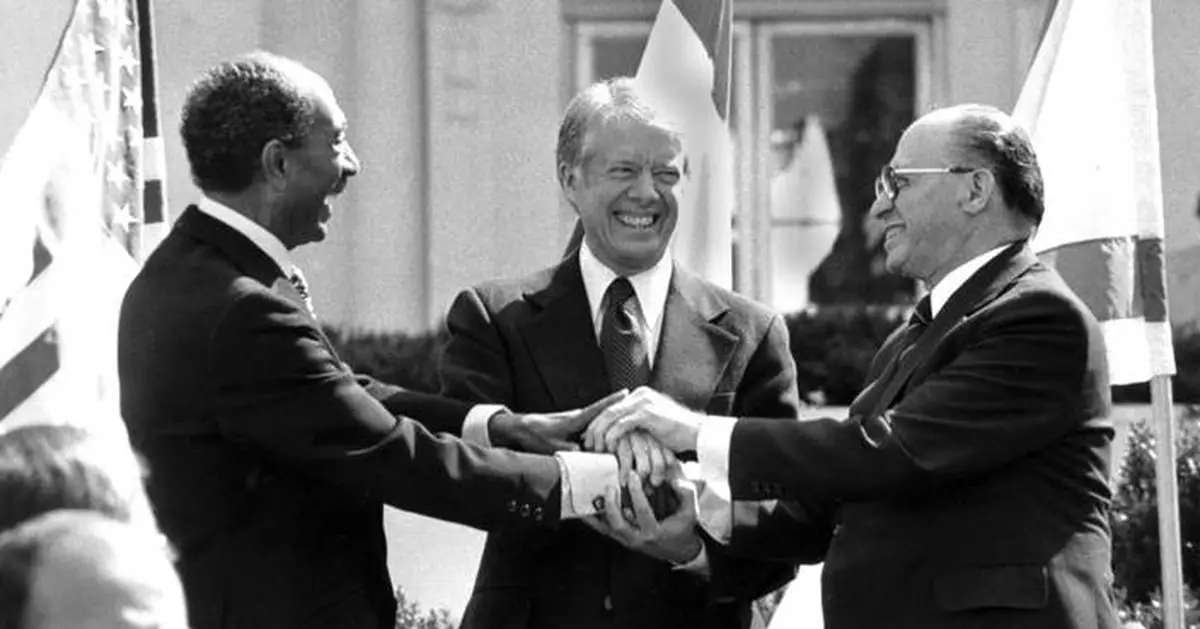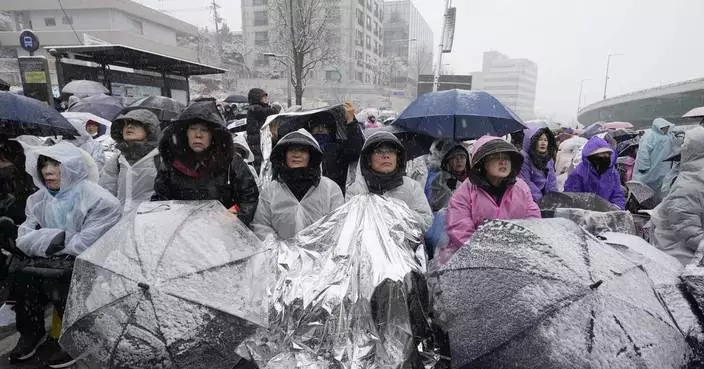JERUSALEM (AP) — As president, Jimmy Carter brokered the watershed peace agreement that removed Israel’s most powerful enemy from the battlefield. But he incurred the Israeli government's wrath decades later when he said its military rule over the Palestinians amounted to apartheid.
The Camp David peace accords, signed by Israel and Egypt in 1978, remain the biggest achievement from decades of mostly failed U.S. peacemaking in the Middle East.
But for Carter, who died on Sunday at the age of 100, they were clouded by what he saw as the continued oppression of the Palestinians and Israel’s expansion of settlements on lands they want for a future state.
Carter did not speak publicly after entering hospice care, months before the outbreak of the latest war in Gaza. But he devoted much of his life during and after his presidency trying to broker a just solution to the wider conflict.
When Carter assumed office in 1977, Egypt and Israel had fought four devastating wars, the last of which began with an Egyptian surprise attack in 1973 that initially seemed to threaten Israel’s existence.
Carter’s efforts led to Egyptian President Anwar Sadat’s landmark visit to Jerusalem and saw U.S. negotiators eventually wear down the famously hawkish Israeli Prime Minister Menachem Begin.
“There would not be a peace agreement between Israel and Egypt without President Carter,” said Aharon Barak, a former Israeli attorney general and Supreme Court president who served as the Israeli legal adviser during the negotiations.
Barak described Carter as a dogged negotiator, forcing the sides to work from 6 a.m. until after midnight and getting involved in the smallest details.
“He was very tough, knew what he wanted, and he got what he wanted. And I admired it,” he said.
The first ever peace treaty between Israel and an Arab country saw Israel withdraw from the Sinai Peninsula, which it had captured in the 1967 Mideast war, and forge full diplomatic ties with Egypt, which had led the Arab struggle against Israel since its establishment in 1948.
The two countries remain at peace nearly a half-century later.
Although the Camp David agreements called for a transition to Palestinian self-government in the West Bank and Gaza, which Israel also seized in 1967, it was never carried out. Carter was voted out of office two years later amid the Iran hostage crisis, and Mideast peace efforts languished.
When Israelis and Palestinians finally came together to sign the Oslo Accords in 1993, the plan was similar to the one Carter had written 15 years earlier, with the creation of a Palestinian Authority and Israel’s gradual withdrawal from the occupied territories.
But the peace process stalled out yet again in 2000, when the two sides were unable to reach a final agreement at Camp David. An armed Palestinian uprising erupted months later, and Israel launched a heavy military crackdown.
Carter remained actively engaged in the Middle East as a global campaigner for human rights and democracy, with his Carter Center observing Palestinian elections. He spoke out against the 2003 U.S.-led invasion of Iraq, calling George W. Bush the worst president in the history of foreign affairs.
In speeches, articles and a controversial book titled “Palestine: Peace Not Apartheid,” he called on the Palestinians to renounce violence and for U.S. intervention to end the conflict.
But he reserved some of his strongest language for Israel’s sprawling Jewish settlements in the occupied West Bank, saying they were far more built-up than people knew and undermined hope for a negotiated solution to the century-old conflict.
Most controversial was his contention that the situation in the West Bank — where some 3 million Palestinians live under Israeli military rule alongside hundreds of thousands of Jewish settlers who have full citizenship — amounts to apartheid.
In a 2007 interview defending the book, Carter said the term was a “very accurate description” of the “total domination and oppression of Palestinians.”
Carter insisted the tough talk was coming from someone who had devoted his life to trying to bring about a lasting peace for Israel, but few Israelis saw it that way. Israel’s supporters said the book was slanted against it and contained a number of inaccuracies.
Israel bristles at any suggestion that its open-ended rule over the Palestinians amounts to apartheid, viewing it as an attack on its very legitimacy. It points to the fact that its own Arab minority has full citizenship, including the right to vote.
Barak rejected the apartheid assertions, saying that as head of the Supreme Court he had presided over numerous rulings in favor of Palestinians against Israeli security bodies. “That’s not apartheid,” he said.
“He was a complicated person,” Barak said of Carter. “But on balance, I think he was a friend of Israel.”
The situation Carter described has only grown worse for the Palestinians. There have been no peace talks in well over a decade, Israel is rapidly expanding settlements, and its far-right government supports outright annexation of parts of the West Bank, making the establishment of a viable Palestinian state virtually impossible.
Human Rights Watch, Amnesty International and the Israeli rights group B’Tselem have meanwhile adopted Carter’s language to describe the conflict, publishing lengthy reports in recent years arguing that Israel is guilty of the international crime of apartheid.
Omar Shakir, the Israel and Palestine director of Human Rights Watch, said Carter’s words were groundbreaking.
“Today, apartheid is the consensus within the global human rights movement and yet, despite the increasingly transparent reality on the ground, few leaders in the U.S. and Europe dare to utter the words President Carter did more than 16 years ago,” Shakir said.
In April 2008, an 83-year-old Carter toured the region with the Elders, a group of retired international leaders founded by Nelson Mandela. He once again courted controversy by meeting with the top leaders of the Islamic militant group Hamas, which had recently seized control of the Gaza Strip. Hamas does not accept Israel’s existence and has carried out hundreds of deadly attacks over the years.
But Carter said he had secured a personal commitment that Hamas would accept a Palestinian state on the 1967 borders if the agreement were approved in a Palestinian referendum — a potentially big step toward accepting Israel.
The Israeli government refused to meet with Carter, and both Israel and the U.S. criticized his decision to meet with Hamas.
Israel and Hamas went on to fight five wars in Gaza, the deadliest of which was triggered by a bloody Hamas incursion into southern Israel on Oct. 7, 2023, and is still ongoing.
For Carter, now remembered the world over as a statesman and a humanitarian, the failure to resolve the conflict was a bitter disappointment.
‘’The most important single foreign policy goal in my life has been to bring peace to Israel, and peace and justice to Israel’s neighbors,” Carter told an Israeli newspaper during the 2008 visit.
“I have done everything I could in office and since I left office to do that.”
Associated Press writer Josef Federman contributed.
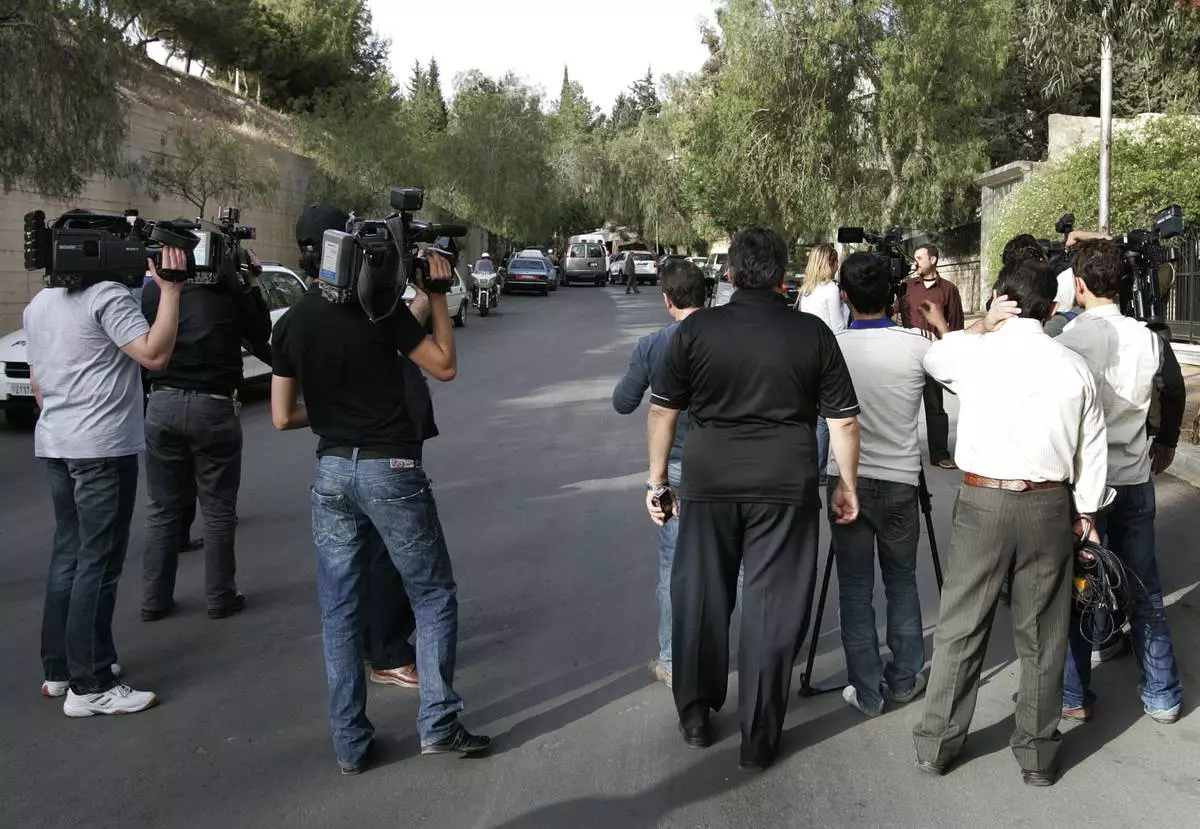
FILE - Syrian cameramen and journalists wait after they were prevented from covering a meeting between former U.S. President Jimmy Carter and Hamas political leader Khaled Mashaal in Damascus, Syria, on April 18, 2008. (AP Photo/Hussein Malla, File)
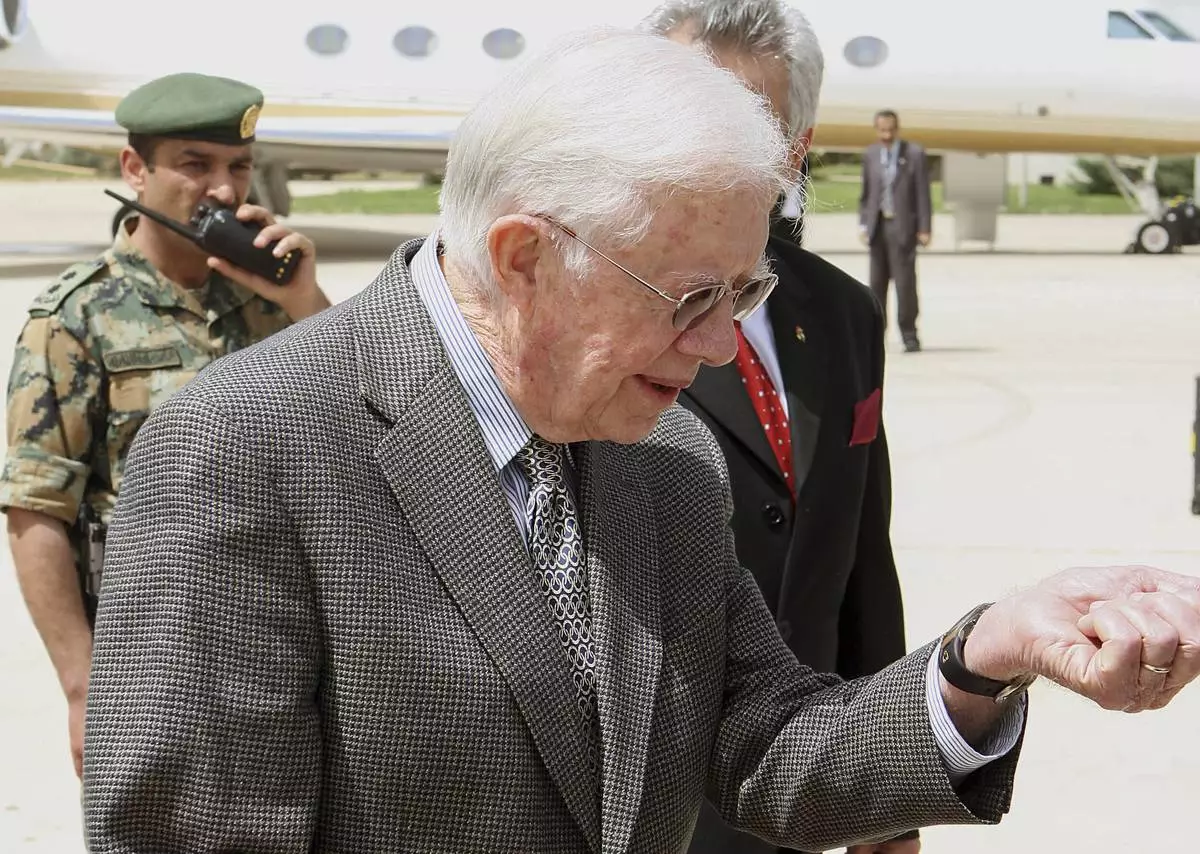
FILE - Former U.S. President Jimmy Carter looks at his watch upon arriving at Queen Alia International airport in Amman ,Jordan, on April 20, 2008. Earlier on his Middle East tour, Carter met with exiled Hamas leader Khaled Meshaal despite strong opposition from Israel and the White House. (AP Photo/Jamal Nasrallah, Pool, File)
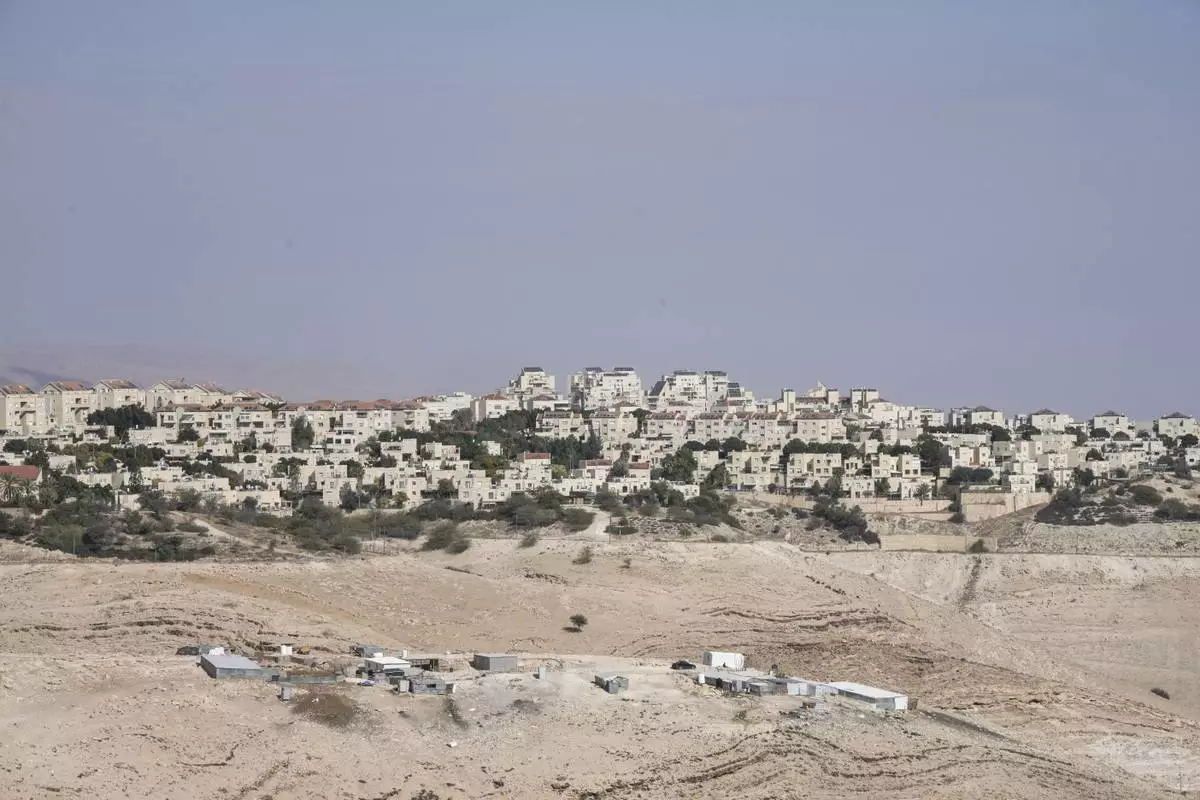
FILE - A view of the Israeli settlement of Maale Adumim in the West Bank, on Dec. 29, 2024. (AP Photo/Mahmoud Illean, File)

FILE - Mourners carry the body of Palestinian Zein Atatrah, 18, wrapped with a Hamas flag during his funeral in Ya'bad, West Bank, on Dec. 27, 2024. (AP Photo/Nasser Nasser, File)
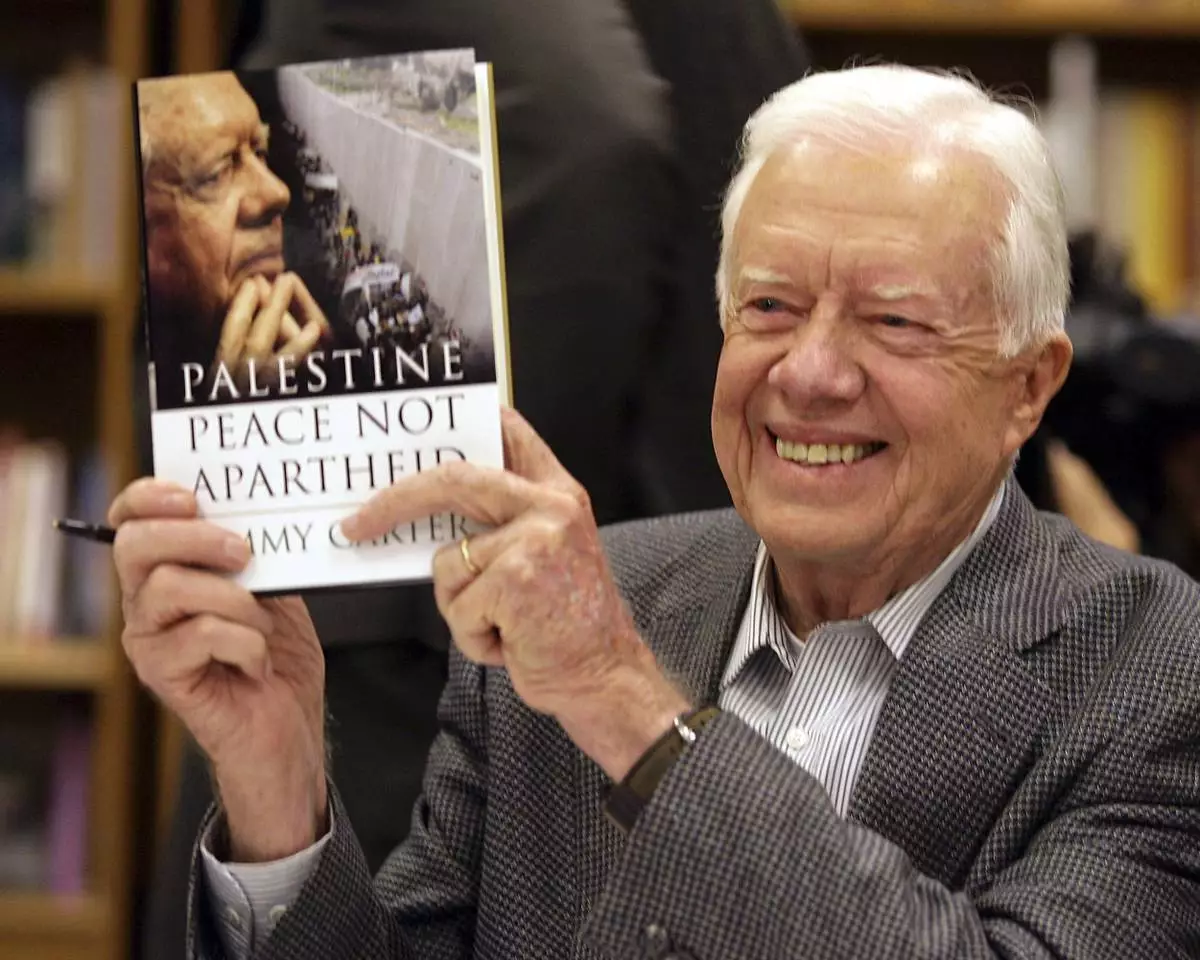
FILE - Former President Jimmy Carter holds a copy of his book, "Palestine: Peace, Not Apartheid," prior to a book signing at the Changing Hands bookstore on Dec. 12, 2006, in Tempe, Ariz. (AP Photo/Paul Connors, File)

FILE - Palestinian leader Yasser Arafat waves to supporters shortly after his arrival at Gaza International Airport on July 26, 2000. The Camp David summit, in pursuit of a Middle East peace settlement, collapsed on July 25 without an agreement between Israel and the Palestinians. (AP Photo/Lefteris Pitarakis, File)
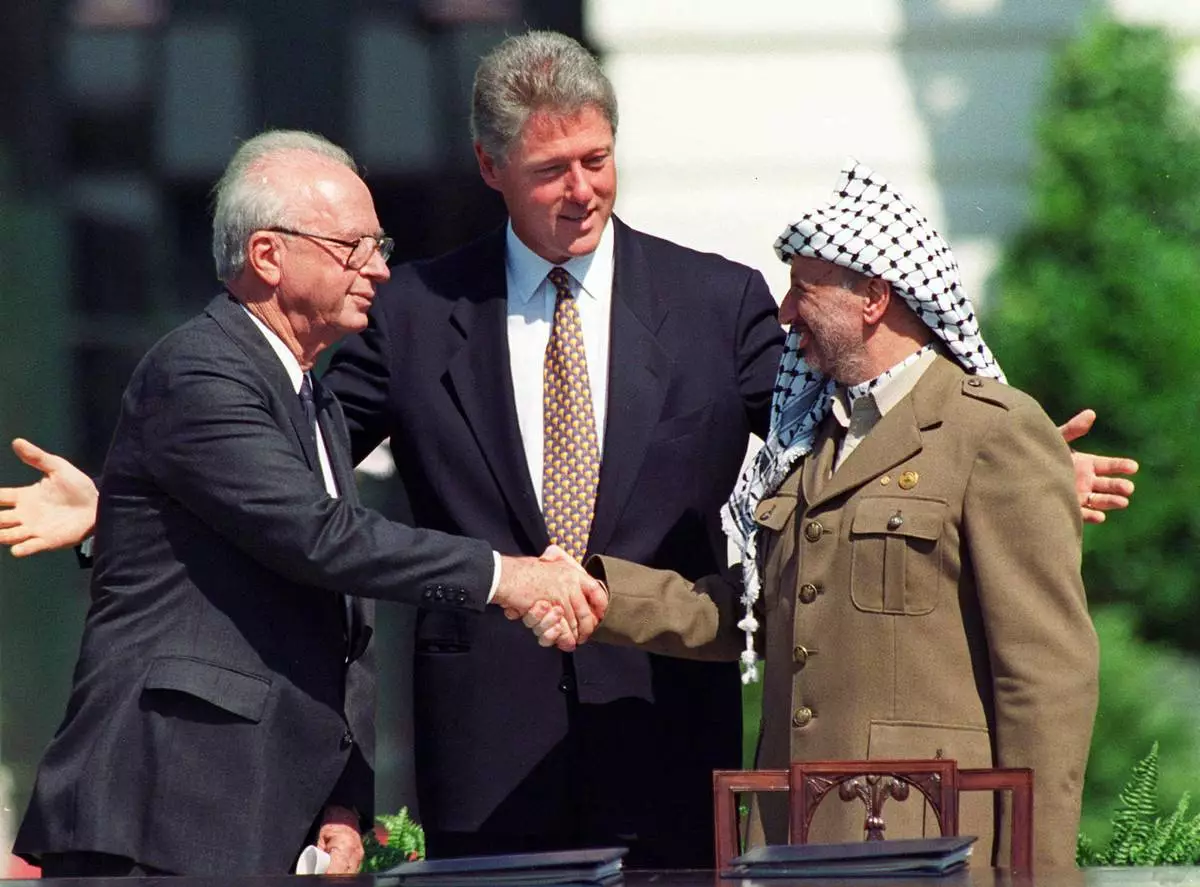
FILE - U.S. President Bill Clinton watches as Israeli Prime Minister Yitzhak Rabin, left, and Palestinian leader Yasser Arafat shake hands, marking the signing of the peace accord between Israel and the Palestinians, in Washington on Sept. 13, 1993. (AP Photo/Ron Edmonds, File)
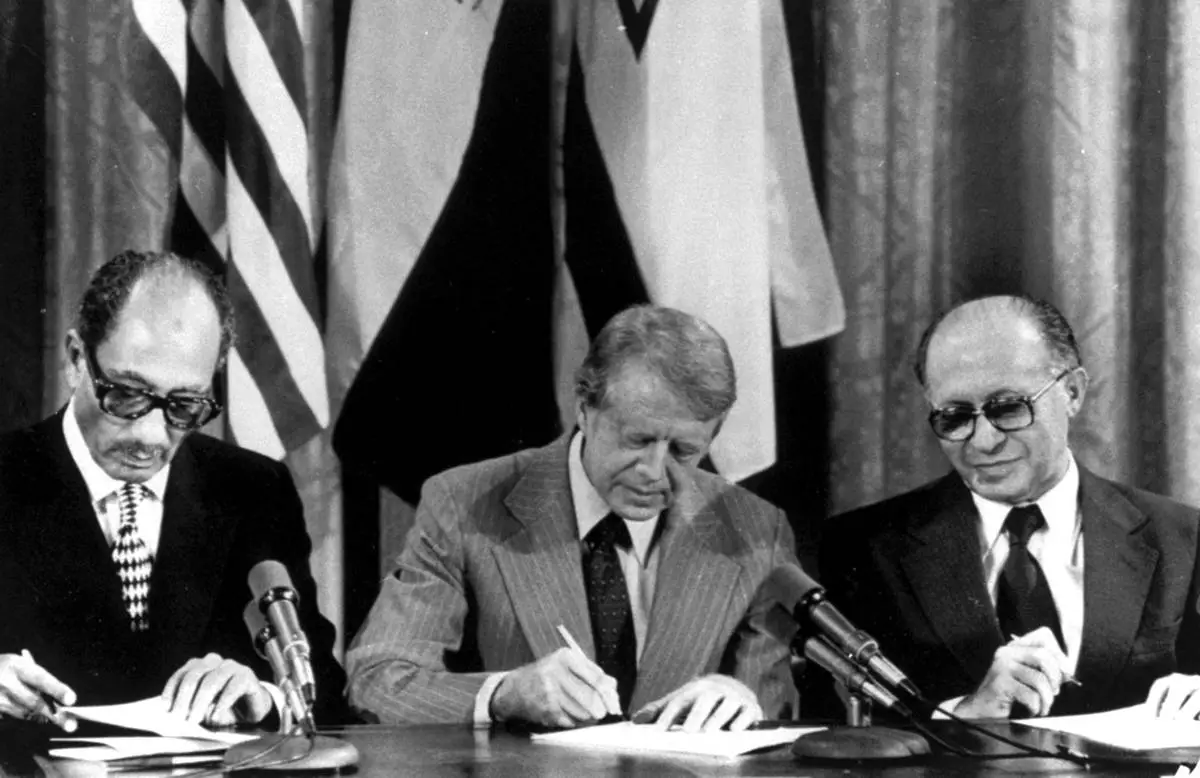
FILE - From left, Egyptian President Anwar Sadat, U.S. President Jimmy Carter, and Israeli Prime Minister Menachem Begin sign one of two agreements forged at the Camp David summit during a joint announcement at the White House on Sept. 17, 1978. (AP Photo, File)
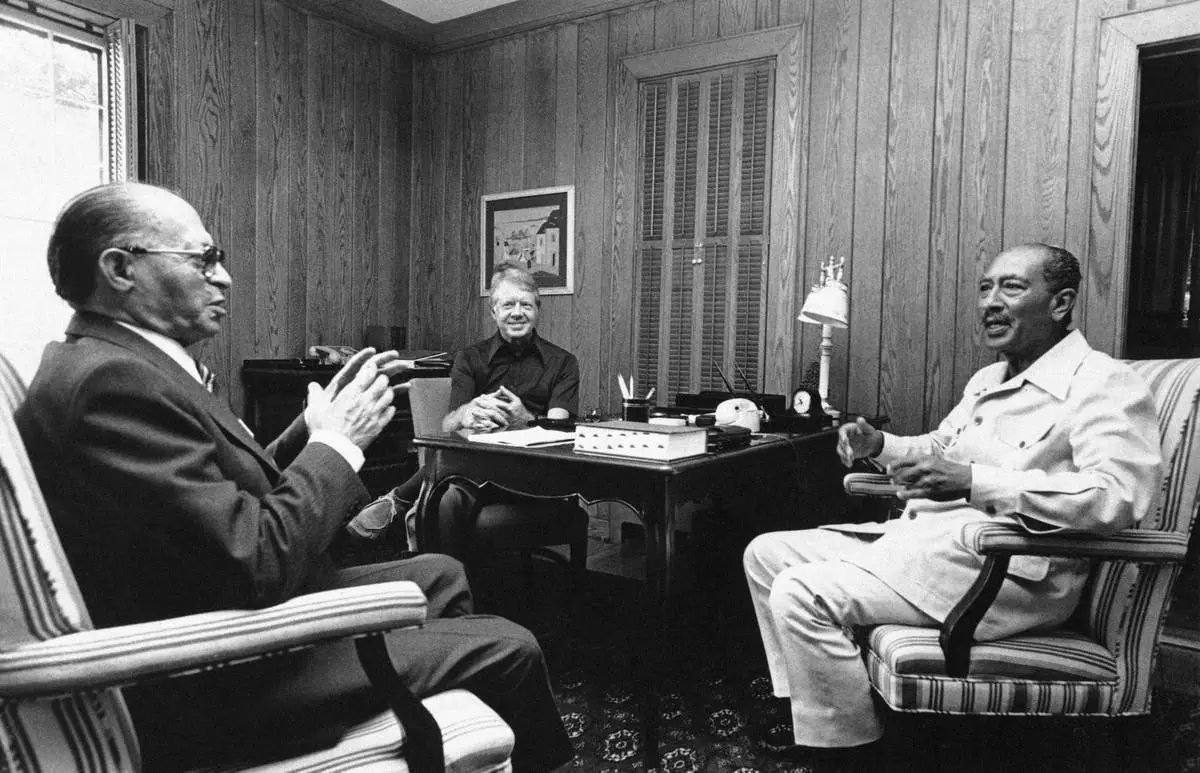
FILE - In this Official White House photo, Israeli Prime Minister Menachem Begin, left, President Jimmy Carter, center, and Egyptian President Anwar Sadat begin their second day of peace talks at Camp David, Md., on Sept. 7, 1978. (AP Photo/Official White House Photo, File)
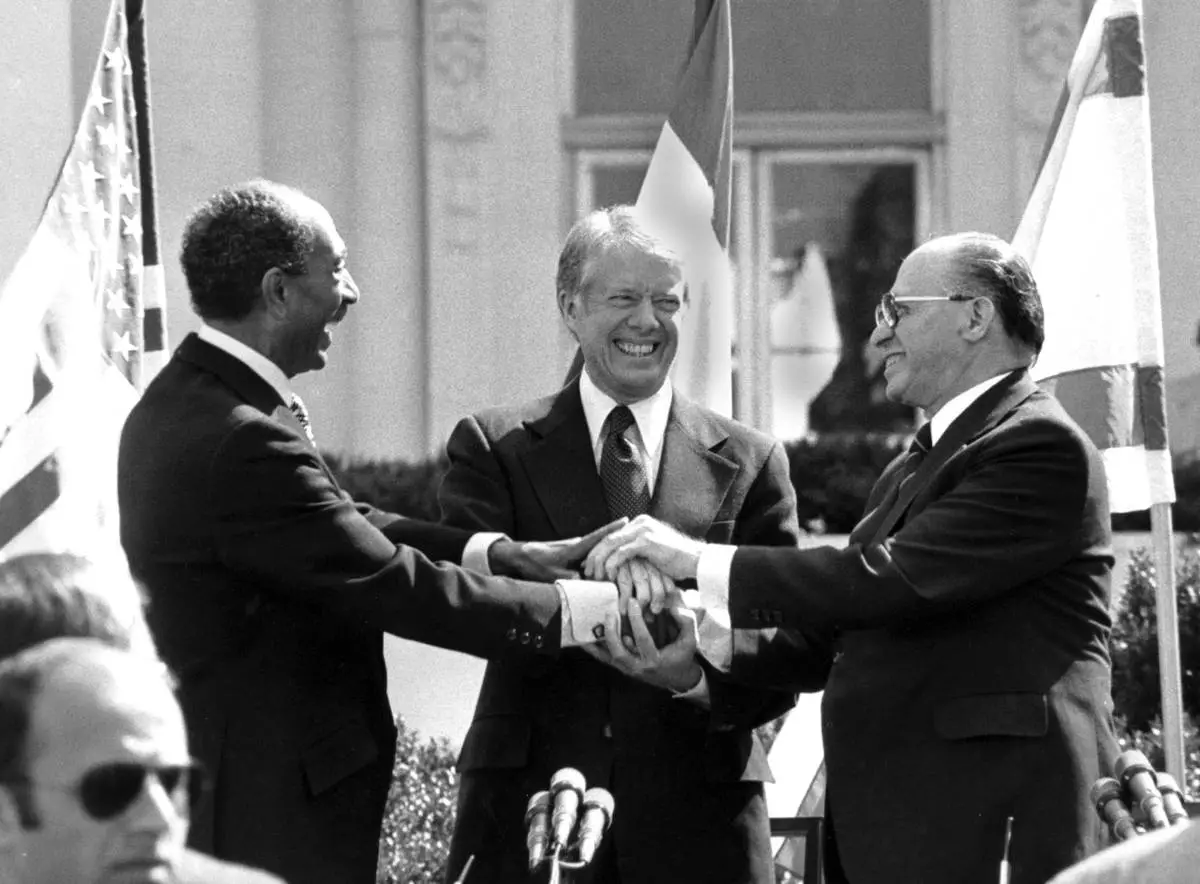
FILE - Egyptian President Anwar Sadat, left, U.S. President Jimmy Carter, center, and Israeli Prime Minister Menachem Begin clasp hands on the north lawn of the White House after signing the peace treaty between Egypt and Israel on March 26, 1979, in Washington. (AP Photo/ Bob Daugherty, File)


